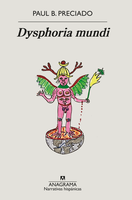Territorializing the Soul of the World
Preciado, Paul B. Dysphoria mundi. Barcelona, Anagrama, 2023.
DOI:
https://doi.org/10.30827/tn.v7i2.30950Keywords:
Post-structuralism, Gender, Sexuality, Deleuze, Disphoria, Subjectivation, IdentityAbstract
In Dysphoria mundi, his latest book, Paul B. Preciado proposes that we are currently experiencing a change of episteme, caused by the covid-19 pandemic. Always in direct dialogue with great representatives of post-structuralism such as Foucault or Derrida, he gives an account of the functioning of the technologies of our current regime, which he has named “petrosexorracial”. From a holistic and interdisciplinary perspective, Preciado incorporates instructions for concrete praxis into the description of contemporary forms of oppression, manifested in ideas such as sexual difference or the binary conception of gender. In the face of systemic and institutional violence, the author proposes alternative logics, new ways of thinking ―such as those demanded by antidisciplinary hybridisation or disidentification― that are accompanied by political strategies essential for resistance to reactionary currents of thought. Preciado proposes the deceleration of the rhythms of late capitalism as part of a social and cognitive restructuring necessary to draw new lines of flight.
Downloads
References
Deleuze, Gilles. Conversaciones. Traducido por José Luis Pardo, Valencia, Pre-Textos, 1996.
____. y Félix Guattari. El Anti Edipo. Capitalismo y esquizofrenia. Traducido por Francisco Monge, Barcelona, Paidós, 1985.
Foucault, Michel. Las palabras y las cosas. Traducido por Elsa Cecilia Frost, Madrid, Siglo XXI, 1968.

Published
How to Cite
Issue
Section
License
Theory Now. Journal of Literature, Critique, and Thought is an immediate open-access publication which is available at no cost for readers and authors alike. Authors are not charged any kind of fee for the editorial processing of their articles. Reading, downloading, copying, distributing, printing, searching, linking or reusing all published articles for non-commercial uses is allowed on the condition of citing the author, the journal and the editing body. All intellectual material published in this journal is protected under a Creative Commons Attribution-NonCommercial 3.0 Spain license.
Dissemination of the articles in social (Facebook, Twitter, Linkedin, etc.) and scientific networks (ResearchGate, Academia.edu, etc.), public repositories at universities and other institutions, blogs, personal or institutional websites, Google Scholar, ORCID, ResearchID, ScopusID, etc. is strongly encouraged. In all cases, the intellectual property of the articles and any possible monetary profits derived from them belong exclusively to the authors.












